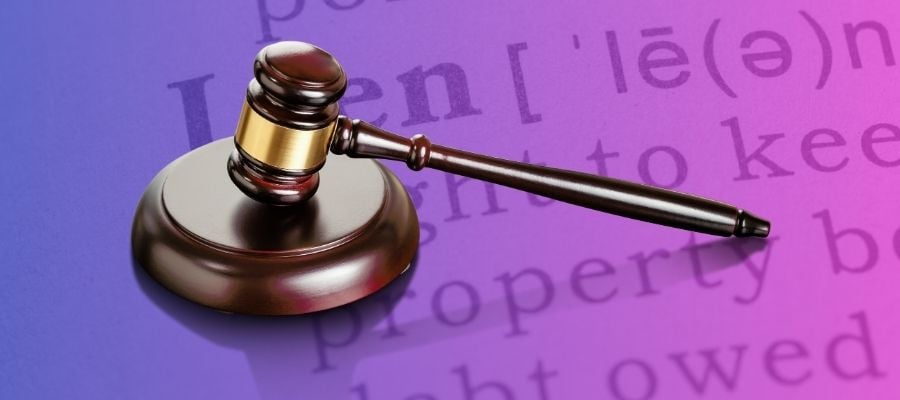
Demystifying Property Judgment Liens for Real Estate

An often overlooked, yet critical aspect of real estate investing is understanding liens and how they can impact property ownership and ultimately, return on investment. One such lien that often perplexes real estate investors is a property judgment lien. But what is a judgment lien on a property? And how does it differ from other liens?
A judgment lien is a type of legal claim against a property. It's often a result of a court's ruling, where the property owner owes a debt and thus, a lien is placed on the property. The lien must be paid off to satisfy the judgment before the owner can sell or refinance the property. It's an involuntary lien, meaning it's not set up with the voluntary consent of the property owner.
Types of Liens: A Detailed Overview
There are various types of liens that can be enforced against a property. These may include tax liens, mechanics liens, and judgment liens. Each type of lien carries different implications and processes. Understanding the building blocks of a successful real estate business includes becoming familiar with these types of liens.
A tax lien, for example, is related to unpaid taxes on a property. It's generally considered a first lien, meaning it must be paid off before other obligations. On the other hand, a mechanic's lien is often linked to unpaid services for home improvement or construction works.
However, a property judgment lien is uniquely characterized by its origins in a court ruling. This comes with its own set of legal considerations.
Judgment Liens vs Other Liens: Key Differences and Similarities
Understanding the differences and similarities between a judgment lien and other types of property liens can help real estate investors plan their strategies more effectively. The most significant difference is often the process by which these liens are created. Whereas other liens may arise from contractual agreements or statutory requirements, a judgment lien is typically the result of a lawsuit.
That being said, a similarity shared by all these liens is their impact on property ownership. No matter the type of lien, the consequence is typically the same: an encumbrance on the property which must be paid off for the property owner to fully control his/her asset.
Implications of a Judgement Lien on Real Estate Investments
The presence of a judgment lien can greatly influence real estate investing decisions. Ignoring such liens can lead to expensive surprises down the line. For an investor, a judgment lien can compromise profitability or even lead to the necessity to foreclose on the property. To avoid such issues, understanding and analyzing a real estate deal carefully can often involve an understanding of liens.
A judgment lien is a type of legal claim against a property. It's often a result of a court's ruling, where the property owner owes a debt and thus, a lien is placed on the property. The lien must be paid off to satisfy the judgment before the owner can sell or refinance the property. It's an involuntary lien, meaning it's not set up with the voluntary consent of the property owner.
Handling a Property Judgment Lien: Expert Tips
Real estate investing requires careful navigation of liens. It's crucial for investors to research potential liens thoroughly.
Checking local county records is a must. If a lien and judgment are discovered, negotiating for a pay-off amount that's less than the owed amount may be a smart move. Consulting with a real estate attorney is also advisable.
In DealMachine, each property also displays if there is a lien on the property, the type of lien, and any relevant details of the lien. While you'll know the basics of the lien from the property card, you might have to dig deeper into the lien to find out the exact situation of the lien.
Remember, if you need help resolving liens on your property be sure to consult a legal professional for advice specific to your situation and region.
Common Myths about Property Judgment Liens Debunked
There's a prevailing myth that liens do not hold any importance unless a property owner wants to sell. This is far from the truth. Liens can inflate the cost of property ownership and impact investment returns at any stage of the investment process, not just the exit strategy.
Another common misconception is that judgment liens are short-lived and expire quickly. In reality, the duration of a judgment lien varies by state and can often be renewed, potentially extending its impact on the property.
Additionally, some believe that judgment liens only affect the property's selling price. However, they can also influence refinancing options and limit the owner’s ability to secure further financing against the property. Understanding that liens can affect more than just the final sale is crucial for informed decision-making in real estate.
It's also wrongly assumed that all of the lien's details are publicly disclosed and easy to find. While tax and mechanic's liens are typically recorded and easy to track, judgment liens may not always be as transparent. They often require more in-depth research, such as examining court records or consulting legal experts, to uncover. This highlights the importance of thorough due diligence in real estate transactions.
Lastly, there's a misconception that resolving a judgment lien is always a straightforward process of paying off the debt. The reality can be more complex, involving negotiations, legal nuances, and sometimes even litigation. Understanding these aspects is vital for effectively managing and resolving judgment liens in real estate investments.
How to Prevent Judgment Liens
Preventing a judgment lien can often be as simple as fulfilling financial responsibilities timely. Having comprehensive insurance and practicing good risk management can help avoid lawsuits that may lead to judgment liens. Further, establishing a legal entity to hold your real estate can offer an extra layer of protection. To ensure continued success in real estate investing, appropriate strategies can help avoid lien-related troubles.
In addition to these measures, regular legal audits and consultations can be instrumental in identifying potential risks before they escalate into legal challenges. Staying informed about changes in laws and regulations related to property and debt can also preempt potential liens.
It’s equally important to maintain transparent and open communication with contractors, service providers, and anyone else who might have a legitimate claim against your property. This proactive approach can help resolve disputes amicably before they turn into legal battles.
Developing a keen understanding of state-specific lien laws is also crucial, as these laws can vary significantly and impact how liens are applied and enforced. By adopting these preventive strategies, real estate investors can significantly reduce the risk of facing a judgment lien, thereby securing their investments and ensuring smoother property management.
Understanding property liens and their impacts is a core requirement for successful real estate investing. It can shape investment decisions and determine the attractiveness of potential investment properties. Remember, when it comes to property judgment liens, knowing is indeed half the battle.

About Samantha Ankney
Samantha is the Social Media Manager at DealMachine, where she oversees all social media strategies and content creation. With 4 years of experience at the company, she originally joined as a Media Specialist, leveraging her skills to enhance DealMachine's digital presence. Passionate about connecting with the community and driving engagement, Samantha is dedicated to sharing valuable insights and updates across all platforms.



